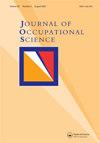Examining racial, ethnic, and cultural diversity in occupational science research: Perspectives of persons of color
IF 2.4
Q1 SOCIAL SCIENCES, INTERDISCIPLINARY
引用次数: 3
Abstract
ABSTRACT Diverse sociodemographic identities, including race, culture, ethnicity, and gender, are important influences on one’s occupational patterns and choices. However, occupational science theories and research were originally driven by Western White middle-class researchers and conducted on White participants. With a focus on the Western context, we sought to identify areas for improvement in the delivery and conduct of occupational science research with considerations of race, ethnicity, culture, and occupation among underrepresented racial groups. A critical content analysis was conducted of empirical research undertaken in Western countries between 2015 and 2020 and published in the Journal of Occupational Science (JOS). This analysis asked (a) What is the stated positionality of first author? (b) What are the racial or ethnic orientations of research participants? and (c) Is there explicit discussion of a racial/ethnic phenomenon? The findings reveal a lack of scholarship on race, ethnicity, and culture. Many primary authors did not explicate their positionality in relation to the research topics and study participants. The findings reify that the current production of occupational science research continues to occur within a wider field of social relations that is characterized by the agendas, interests, and values of the dominant group. Informed by critical race theory, we urge occupational science academic journals and their contributing authors to commit to epistemological antiracism. We recommend making space for racialized perspectives; acknowledging how these identities affect engagement and choice of occupations; clarifying who regulates, narrates, and participates in occupational science research; and creating inclusive scholarly ecosystems.审视职业科学研究中的种族、民族和文化多样性:有色人种的视角
不同的社会人口特征,包括种族、文化、民族和性别,对一个人的职业模式和选择有重要影响。然而,职业科学理论和研究最初是由西方白人中产阶级研究人员推动的,并以白人为对象进行的。以西方背景为重点,我们试图在考虑种族、民族、文化和未被充分代表的种族群体的职业的情况下,确定职业科学研究的交付和实施方面需要改进的领域。对2015年至2020年间在西方国家进行的实证研究进行了批判性内容分析,并发表在《职业科学杂志》(JOS)上。这个分析问(a)第一作者的地位是什么?(b)研究参与者的种族或民族倾向是什么?(c)是否有关于种族/民族现象的明确讨论?研究结果表明,在种族、民族和文化方面缺乏学术研究。许多主要作者没有说明他们在研究主题和研究参与者方面的立场。研究结果证实,目前的职业科学研究继续发生在一个更广泛的社会关系领域,这个领域以主导群体的议程、利益和价值观为特征。在批判种族理论的指导下,我们敦促职业科学学术期刊及其投稿作者致力于认识论的反种族主义。我们建议为种族化观点留出空间;承认这些身份如何影响职业的投入和选择;明确谁来规范、叙述和参与职业科学研究;创造包容性的学术生态系统。
本文章由计算机程序翻译,如有差异,请以英文原文为准。
求助全文
约1分钟内获得全文
求助全文
来源期刊

Journal of Occupational Science
SOCIAL SCIENCES, INTERDISCIPLINARY-
CiteScore
4.30
自引率
41.70%
发文量
46
 求助内容:
求助内容: 应助结果提醒方式:
应助结果提醒方式:


